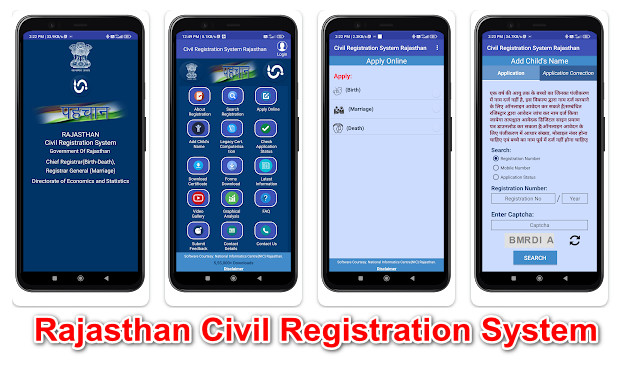Rajasthan Civil Registration System: Rajasthan’s Civil Registration System (CRS) is a structured process mandated by the state government to record vital events such as births, deaths, and marriages.
This comprehensive system is essential for maintaining accurate demographic data and providing necessary legal documentation.
In this article, we will explain the importance of the CRS in Rajasthan, the steps involved in registering vital events, and answer frequently asked questions.

Rajasthan Civil Registration System (राजस्थान नागरिक पंजीकरण प्रणाली)
Why the Rajasthan Civil Registration System is Important? The CRS in Rajasthan is crucial for:
- Legal Documentation: Providing official records of births, deaths, and marriages.
- Government Benefits: Ensuring access to various state and central government schemes and services.
- Policy and Planning: Aiding in demographic data collection, which is vital for policy-making and resource allocation.
How to Register Vital Events in Rajasthan?
Birth Registration
- Hospital Births: Hospitals are responsible for registering births and issuing birth certificates.
- Home Births: The head of the household or an authorized person must report the birth to the local registrar within 21 days.
Death Registration
- Hospital Deaths: Hospitals report deaths to the registrar and provide death certificates.
- Home Deaths: The nearest relative or head of the household must report the death to the local registrar.
Marriage Registration
- Marriages can be registered under the Hindu Marriage Act, of 1955, or the Special Marriage Act, of 1954, based on religion and preferences.
- The process involves filling out an application form, submitting necessary documents, and appearing before the registrar.
| Vital Event | Registration Process | Responsible Party | Timeframe |
| Birth Registration | – Hospital Births: Hospitals register births and issue birth certificates. | Hospitals | Immediate/On birth |
| – Home Births: Report the birth to the local registrar. | Head of Household or Authorized Person | Within 21 days | |
| Death Registration | – Hospital Deaths: Hospitals report deaths and provide death certificates. | Hospitals | Immediate/On death |
| – Home Deaths: Report the death to the local registrar. | Nearest Relative or Head of Household | Within 21 days | |
| Marriage Registration | – Register under the Hindu Marriage Act, 1955 or the Special Marriage Act, 1954. | Both parties applying to the registrar | After marriage |
Read more: Civil Registration System in India Importance, Process, Benefits & Key Facts
Frequently Asked Questions (FAQs)
Q: What documents are required for birth registration in Rajasthan?
A: Typically, you’ll need proof of birth from the hospital, identification documents of parents, and a residence certificate.
Q: Can late registration of births or deaths be done?
A: Yes, but it requires additional documentation and may incur a nominal late fee.
Q: How long does it take to obtain the certificates?
A: The processing time usually ranges from a few days to a couple of weeks, depending on the registrar’s office workload.
Q: Is there a fee for registering for these events?
A: The fee structure varies by district and type of registration. Basic registrations often have nominal fees, while late registrations may incur additional charges.
Conclusion
The Rajasthan Civil Registration System ensures that all vital events are legally documented and certified. This system not only provides individuals with essential legal documents but also helps the state maintain accurate demographic data.
By understanding the registration process for births, deaths, and marriages, citizens can easily comply with legal requirements and secure their rights and benefits.
